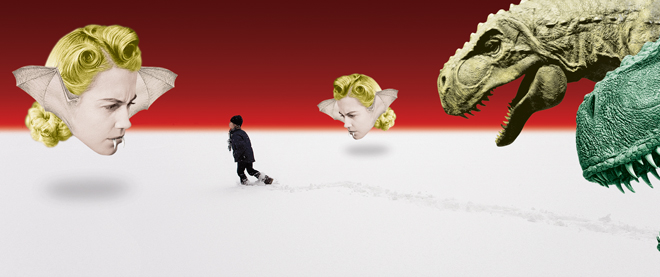Everybody hates Idaho Winter
In Tony Burgess’s brilliant YA parody, even the crossing guard wants to kill the hero
Getty Images; Photo illustration by Taylor Shute
Share

The title character in the novel Idaho Winter lives in a world beyond mere misery. Every morning Potato, as he is universally known, is given for breakfast whatever Growler, the evil dog belonging to his evil father, Early Winter, has recently killed. As the novel opens, that happens to be a fly-encrusted raccoon. Every day, as Idaho walks to his small-town school, the crossing guard tries to kill him by luring him into traffic. The other children beat him cruelly; his neighbour has been abusing three pit bulls since their birth in hopes they will someday tear Idaho to pieces; his teacher daily checks his wounds by gouging her fingernails into them.
And yes, Idaho Winter is not just funny, it’s supposed to be funny, even if at readings author Tony Burgess sometimes has to tell his appalled audiences it’s okay to laugh. “It can be hard,” he adds gravely in an interview, “to choose a section to read.” (Probably not, then, that part where Madison, the sweet little girl who alone in the world wishes to be Idaho’s friend, has her feet chewed off by the crazed pit bulls.) Burgess’s novel, in fact, is one the finest parodies ever penned of the stereotypically didactic young adult (YA) novel—fiction for teens—of the sort often more beloved by teachers than by readers.
Beneath YA’s newly lucrative surface—both the Harry Potter novels and the Twilight series are technically included within its wide embrace—the genre’s sturdy bedrock is formed by what have been called “problem novels.” Their adolescent protagonists wrestle with issues: sexuality (of course), including orientation, promiscuity, STDs and pregnancy; being different in any way; anorexia; bulimia; loneliness; controlling parents; indifferent parents; absent parents; mentally ill parents—and every other shock the teen flesh is heir to. So endemic is this basic approach to YA that it holds a solid place even in fantasy novels. Harry Potter, after all, is kept in a closet beneath the stairs by his cruel uncle.
No one has gone at the richly deserving YA genre in a way like Burgess. The author of Pontypool Changes Everything, an absurdist zombie classic in which the killer virus is passed by speaking, always writes in some fashion about language itself, that treacherous human invention, and about storytelling. (Thus, while Pontypool, Ont., is a real town, one thing about it that appealed as a setting to Burgess, who also lives in rural Ontario, was that “typo” is in the middle of its name.) Idaho Winter is vintage Burgess. Just as the story approaches its apparent climax—the townspeople, now a howling and (naturally) torch-bearing mob, are bearing down for the kill—it veers out of anyone’s control. Idaho, who was supposed to accept his fate, runs away. Soon the terrified narrator finds himself within his book, huddled in a closet with the boy. As soon as Potato learns his misery is due to a writer’s conceit, the id in Idaho takes over the story.
His subconscious is quite the place. At one point two characters, a brother and sister with sexually ambiguous names, suddenly switch genders. (A reader might think this was planned, and the names carefully chosen, but not according to Burgess: “I came back to the story after leaving it aside for two years and I was confused myself—then I decided, ‘Oh well, that works here.’ ”) Idaho’s mom, portrayed by the narrator as a fellow victim of father Early, sure doesn’t seem that way to her son: disembodied heads known as mombats, bearing her features and razor-sharp teeth, start gobbling up the unwary. Not as many, though, as the roaming T. Rexes—Idaho watched Jurassic Park a lot. The dinos mostly feed on punk rockers, from bands that were Early’s favourites. Some, like Green Day singer Billie Joe Armstrong, manage to survive; in his case by keeping Distillers singer Brody Dalle drugged and snoring—she sounds just like a baby tyrannosaur and the adults leave them alone.
It’s up to Burgess’s non-too-bright narrator to save the day. His epic failure to do so forces an editor’s intervention and a slapdash happy ending. If you can believe the treacherous word spinners, that is. In true YA style, there’s a moral to Idaho Winter—don’t trust anything you read.